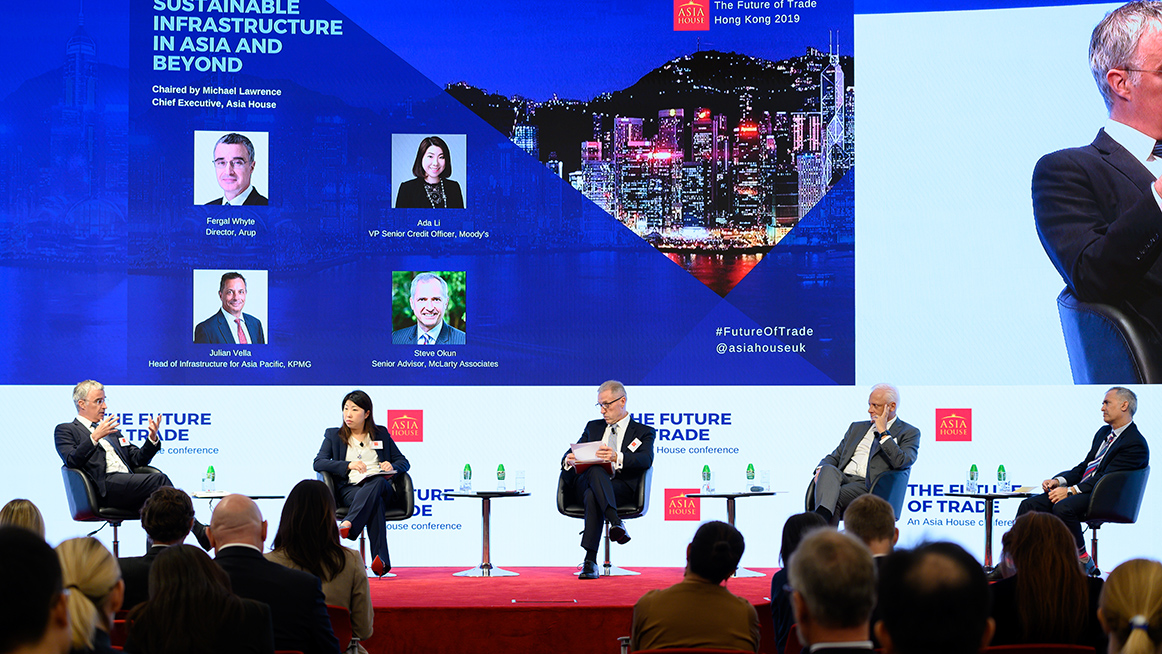Driving commercial and political engagement between Asia, the Middle East and Europe
Driving commercial and political engagement between Asia, the Middle East and Europe
Driving commercial and political engagement between Asia, the Middle East and Europe

China is responding to concerns around sustainability in the Belt and Road Initiative (BRI), but there is still much distance to be travelled, leading industry figures told Asia House’s conference in Hong Kong.
The BRI has the potential to help close Asia’s infrastructure gap, but concerns about the programme continue to be raised amid a tense global environment. Sustainability, which has emerged as a key issue across the infrastructure sector, is now a major BRI discussion point.
The Asia House Future of Trade Conference, held at HKEX in Hong Kong, put the issue in the spotlight with a panel discussion on sustainable investment in BRI infrastructure across ASEAN.
Conference moderator Michael Lawrence, Chief Executive of Asia House, kicked off the debate by pointing out the huge pushback against the BRI, asking panelists whether China has recalibrated its position following high profile issues in Sri Lanka and Malaysia.
Steve Okun, Senior Advisor at McLarty Associates, noted that there are two aspects of this criticism – the charge of debt diplomacy and sustainability aspects. China has made progress in how it presents both of these areas, Okun said, but the BRI “is not there yet, it’s something they’re going to have to address.”
Okun pointed out that 40 per cent of BRI projects in energy are coal projects, which he believes is not the direction that Southeast Asia or the wider investment community is moving in.
“Until China really addresses those issues and walks the walk, it isn’t going to have fully recalibrated,” Okun added. “Hopefully they are going to go in that direction.”
Julian Vella, Head of Infrastructure for Asia Pacific at KPMG, agreed with Okun and added that a number of BRI projects have led to negative effects on local communities. However, this year’s second BRI Forum in Beijing did include more of a sustainability narrative, Vella said, pointing out that this follows a trend of sustainability emerging as a “very big feature” in global infrastructure.
He added that there remains a “real need for private capital to participate in building BRI infrastructure,” and this could help raise standards.
“Private capital requires certain standards to be met and certain behaviours to be adopted,” he said. “I believe that the Chinese authorities are serious about wanting to upgrade the quality of infrastructure and bring in more international participation, including finance, but it’s going to take a little bit of time.”
Looking at the progress that has been made so far, Ada Li, Vice President, Senior Credit Officer at Moody’s, who contributed to the latest edition of Asia House’s Insights publication, said that, compared with 2016-17, there has been an evolution based on lessons learned.
“Compared with the past, which mainly relied on debt financing, there is now more of an in-depth due diligence approach before projects are adopted, as well as increased flexibility throughout the life of the projects,” she said.
Fergal Whyte, Director of Arup, also acknowledged a shift in the way BRI projects are being thought about. Previously, there was more focus on linear construction, without consideration of the wider impact. However, more recently, there has been greater attention paid to projects’ value to their host societies.
“There’s a shift in what’s being left behind for the society,” Whyte said. “What we saw before was a piece of infrastructure being handed over to a local government which didn’t have the capacity to deal with the project. There is now more focus on the operation and maintenance stage, as well as capacity building as part of the construction so that is can be handed over in a position where the society can take it forward.”
The discussion was part of the Asia House Future of Trade Conference, sponsored by InvestHK and HKEX, which explored the forces reshaping the business and policy landscape in Asia and beyond.
